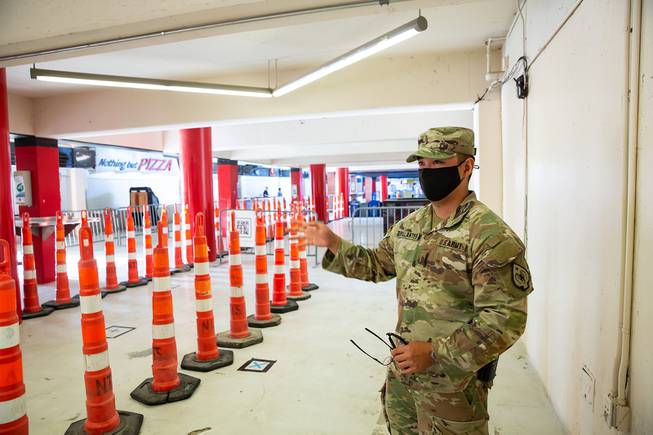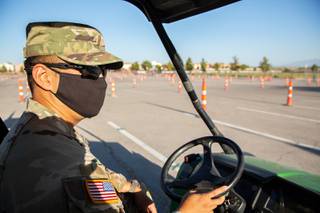
Gideon Brillantes, second lieutenant of the Nevada National Guard, speaks on the procedures in place at the new COVID-19 testing center at Sam Boyd Stadium, Monday, Aug. 31, 2020.
Wednesday, Sept. 2, 2020 | 2 a.m.
The sun is slowly starting to rise in east Las Vegas when Sgt. 1st Class Che Rios of the Nevada National Guard arrives to his post at Sam Boyd Stadium.
There are many possibilities for assignments when joining the guard, none of which seems as important as helping slow the COVID-19 spread. Rios, along with hundreds of other members of the guard, have been activated over the course of the pandemic by Gov. Steve Sisolak to help with testing, supply delivery and managing food banks.
“Joining the guard means you want to serve where you live,” Rios said. “So it gives us a little sense of pride, a sense of where we live, community.”
Rios, the descendant of Mexican immigrants, is one of many Nevada military personnel of color working on the front lines of the pandemic. The ability of Rios and other Hispanic guardsmen to communicate with residents in Spanish has been vital in making sure the site functions.
At the very least, it provides a level of comfort.
“My Spanish isn’t that good but when they see me maybe they feel a little bit better, maybe a little bit of familiarity with me,” Rios said.
Long-standing systemic health and social inequities have put many people from racial and ethnic minority groups at increased risk of getting sick and dying from COVID-19, according to the Centers for Disease Control and Prevention. In Clark County, where 33% of the population is Hispanic, one in every four cases of the virus is a Latino.
Maj. Gen. Ondra Berry, the top officer in the Nevada National Guard, said the guard has worked to provide testing to vulnerable communities, and to keep bilingual personnel on site. The citizens coming through the testing sites, he said, are “extremely diverse.”
“The best thing we can do is test right now,” Berry said.
In Las Vegas proper, almost 33% of the population is Hispanic and 12% is Black. In North Las Vegas, around 41% of the population is Hispanic while 20% is Black. Henderson has a 16.4% Hispanic population rate and a Black population rate of under 6%.
The Sam Boyd testing site is part of a county “testing blitz” through Sept. 18. Other available sites include the Fiesta Henderson at 777 W. Lake Mead Parkway, Texas Station at 2101 Texas Star Lane in North Las Vegas and the Mesquite Streets Division Garage at 725 Hardy Way in Mesquite. These locations are in addition to the testing available at the Cashman Center and UNLV's Thomas & Mack Center.
All that is verified at the site is name, date of birth, address and a phone number. And, most important, proof of citizenship is not sought.
2nd Lt. Gideon Brillantes, whose parents emigrated from the Philippines, is also stationed at Sam Boyd Stadium. He joined the guard in December 2018 and said that his membership allows him to serve on both a national and a local level.
“I want to be part of the community; I also wanted to serve the country,” he said.
Brillantes, whose father was also active duty military, brings up a phrase that many guardsmen use when discussing their service: it’s just “neighbors helping neighbors.”
He said that people can be a bit nervous when they arrive for testing, especially in regard to just how far up the nasal swabs can go. For fearful testers, the swabs at Sam Boyd Stadium are self-administered and only go up about an inch into the nose.
“For the most part, everyone who’s on these orders come from different walks of life,” Brillantes said. “We’ve all got different jobs, we’ve all come from different places. Some of us were born outside of the states.”
There are many members of the guard, Brillantes said, whose parents immigrated to the U.S. He said he was thankful for what they brought and the opportunities “we have here to help them out in return.”
“For them to be part of the guard, to be part of this operation, this mission that we have here in Nevada, it’s just them showing their gratitude to the community,” Brillantes said.

